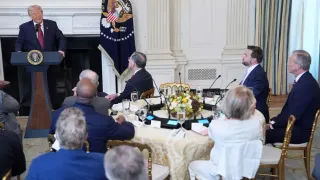
4 hours ago
How the NFL Is Aiming to Broaden Its Appeal to Women
Alyce Brown READ TIME: 3 MIN.
At this year’s NFL draft, some of the league’s top prospects were asked a few questions they weren’t used to.
“What is a skort?” an interviewer asked. Travis Hunter made his best guess.
“What is primer?” she continued. Shemar Stewart wasn’t totally sure.
The questions were part of a social media video asking players about women’s products. It was created by Betches, a media company that caters to a young female audience, and garnered 1.5 million views on Instagram. While it might not be traditional NFL content, it's resonating and building on the league's push to attract young women through partnerships with women-centered media outlets.
The league partnered with Betches last December, and finalized a partnership with The Gist, a female-fan focused sports site and newsletter, in August. The NFL has long seen women as key to their efforts to broaden the league's appeal, a push that gained extra momentum after Taylor Swift began her highly-publicized relationship with now-fiancé Travis Kelce of the Kansas City Chiefs.
“As we want to connect with this audience, authentic, real storytelling is absolutely key,” said Marissa Solis, the senior vice president of global brand and consumer marketing at the NFL. “So rather than doing targeted ads that really don’t connect ... you give access to (Betches and The Gist) but they tell the story in their own point of view, being there, front and center. And I think that connection is something paid advertising can’t do.”
Both outlets receive access to NFL tentpole events — the Super Bowl, the draft and the combine, to name a few — to create articles and content for their platforms, alongside additional league content. Betches, for example, kicked off a tailgate tour series as part of its partnership, and The Gist debuted a free game for predicting each week’s winners.
The partnerships are all in pursuit of growing and engaging the league’s large female fanbase, a demographic that has often been underestimated or overlooked. A September poll by Ipsos found that 41% of American women were NFL fans.
That translates into the potential for big business, leading the NFL to turn to outlets that already have deep connections with women.
“We center women in everything that we do. It’s not an afterthought, it’s not like you are adding the W to the end of ESPN,” said Jacie deHoop, who co-founded The Gist with Ellen Hyslop and Roslyn McLarty in 2017. “More data and research on women is showing what an underserved and huge audience and fan base this is.”
In addition to traditional game reports and on-the-field breakdowns, a large part of the strategy around appealing to women — and to a new generation of NFL fans more broadly — is human-centric content. Through an approach aptly dubbed “helmets off” by the NFL, the league and their partners are focusing on content about the players themselves, looking to forge stronger connections by using more personal storytelling.
According to Solis, that approach has “really opened up the aperture of emotional and human-centric storytelling that really attracts our female fans” – and it’s an area where Betches and The Gist can help fill in.
“There’s a clear white space, and we know how to speak to the casual fan. They care about culture, they care about the person behind these players, and we speak that relatable, authentic tone,” said Randi Windt, the senior vice president for revenue partnerships at Betches.
“Relating to someone will have them lean in, versus pushing a marketing narrative that you think perhaps would get someone to tune in on a Sunday,” Windt continued. The NFL “is not looking just for that tune in ... We’re really collaborating on building fandom over time.”






